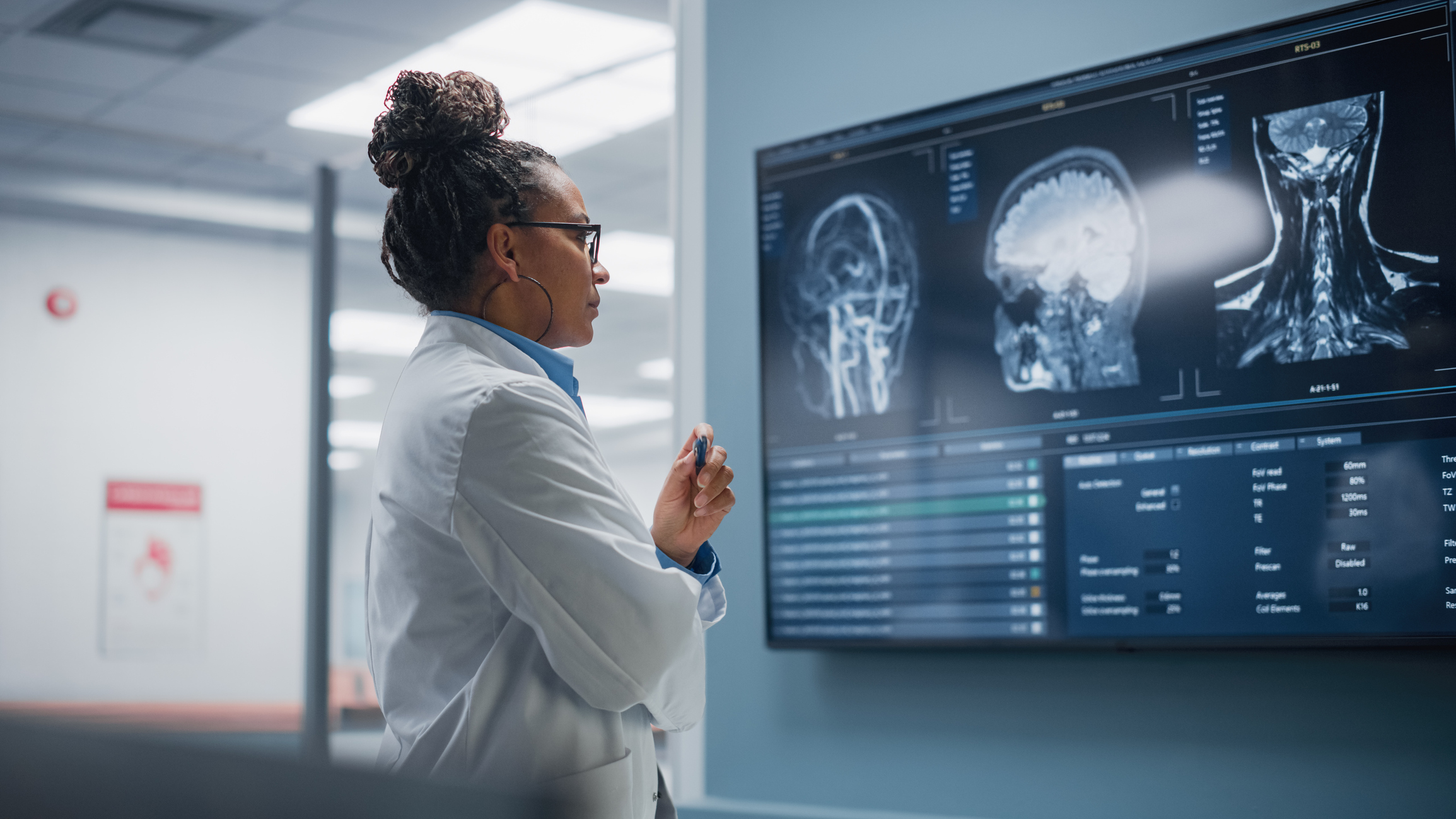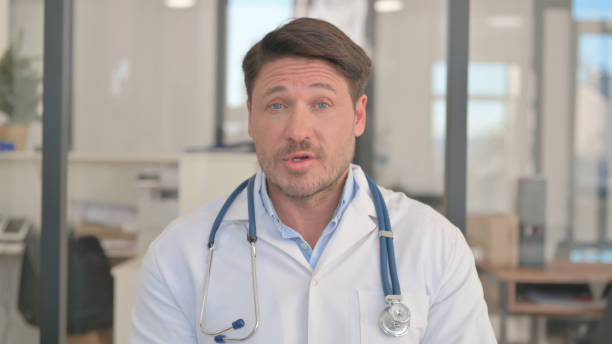Lectures in this category address the spectrum of neurological disorders, from prevalent conditions to rare presentations. Emphasis is placed on advances in diagnostics, therapeutics, and the translation of neuroscientific research into clinical application.
Learn from leading specialists in the field of Neurology, carefully selected from around the globe. Our courses explore everything from breakthrough treatments to everyday clinical challenges, equipping you with the insight and skills to provide exceptional care.
See our courses


Medibuddy Academy offers an exceptional range of courses that are both clinically relevant and thoughtfully designed. The platform’s flexibility allows me to keep learning alongside a demanding schedule. It's a must-have for any medical professional committed to continuous improvement.

This course provides a structured approach to the clinical and radiological evaluation of patients with traumatic brain injury. Participants will review initial assessment, neurological examination, Glasgow Coma Scale scoring, and the role of imaging modalities. Emphasis is placed on risk stratification, early detection of complications, and multidisciplinary assessment strategies.

This course examines evidence-based management of traumatic brain injury across acute, subacute, and chronic phases. Participants will explore medical, surgical, and rehabilitative interventions, as well as prognostic indicators influencing functional recovery and long-term outcomes. Multidisciplinary approaches to optimising neurological and psychosocial rehabilitation are highlighted.

This course addresses the clinical features, diagnostic criteria, and management of post-concussion syndrome. Participants will review neurocognitive, somatic, and psychological manifestations, and explore evidence-based therapeutic strategies, including pharmacological and rehabilitative interventions.

This course provides an overview of post-traumatic headache, exploring its pathophysiology, diagnostic evaluation, and management. Emphasis is placed on differentiating post-traumatic headache from primary headache disorders and tailoring treatment to individual patient needs.

This course reviews the pathophysiology, clinical presentation, and diagnostic criteria for migraine. Participants will examine acute and preventive treatment strategies, lifestyle modification, and the integration of guideline-based management into clinical practice.

This course explores emerging and advanced therapies for migraine, including CGRP-targeted monoclonal antibodies, neuromodulation devices, and novel pharmacologic agents. Participants will evaluate efficacy, safety, and patient selection criteria to optimise outcomes in refractory migraine management.

This course examines trigeminal autonomic cephalgias, including cluster headache, paroxysmal hemicrania, and SUNCT/SUNA syndromes. Participants will review diagnostic criteria, pathophysiology, and treatment strategies, including pharmacologic and interventional approaches.

This course provides an overview of less common headache syndromes, including low cerebrospinal fluid pressure headache, hypnic headache, nummular headache, and cranial neuralgias. Participants will explore diagnostic challenges, differential diagnosis, and evidence-based treatment strategies.

This course addresses the evaluation and management of headache disorders during pregnancy. Participants will examine physiological considerations, diagnostic challenges, and safe treatment options, with emphasis on balancing maternal and fetal health while minimising risk.

This course examines the spectrum of REM sleep disorders, including REM sleep behaviour disorder, narcolepsy, and associated parasomnias. Participants will review clinical features, diagnostic evaluation with polysomnography, and evidence-based management strategies, with emphasis on safety and long-term neurological implications.

This course provides an overview of non-REM sleep disorders, including sleepwalking, night terrors, and confusional arousals. Participants will explore underlying mechanisms, diagnostic challenges, and therapeutic approaches, with a focus on differential diagnosis from epileptic events and psychiatric conditions.

This course addresses the clinical evaluation and management of patients with impaired or altered consciousness, including coma, vegetative state, and minimally conscious state. Participants will review neurophysiological and neuroimaging techniques, prognostic indicators, and ethical considerations in long-term care.

This course explores the structured evaluation of patients with suspected sleep disorders. Participants will examine the use of clinical history, sleep diaries, questionnaires, polysomnography, and actigraphy, with emphasis on integrating findings into accurate diagnosis and management.

This course reviews the typical clinical presentations of FND, including motor symptoms, sensory disturbances, and non-epileptic seizures. Participants will explore distinguishing clinical features, diagnostic pitfalls, and approaches to communicating the diagnosis effectively to patients.

This course provides a systematic framework for diagnosing functional neurological disorder. Participants will review positive clinical signs, appropriate use of investigations, and strategies to avoid unnecessary testing, with emphasis on delivering a clear, patient-centred explanation of the condition.

This course highlights the role of multidisciplinary care in managing functional neurological disorder. Participants will explore physiotherapy, occupational therapy, psychological interventions, and speech and language therapy, with emphasis on collaborative care models that improve patient outcomes.

This course addresses functional neurological disorder from a psychiatric perspective, focusing on comorbidities, psychological mechanisms, and therapeutic approaches. Participants will review strategies for psychiatric assessment, management of mood and anxiety disorders, and integration of psychiatric care within the multidisciplinary model.

This course provides a structured approach to the evaluation of patients presenting with a first seizure. Participants will review clinical history-taking, examination, EEG, neuroimaging, and differential diagnosis, with emphasis on distinguishing epileptic seizures from mimics such as syncope or FND.

This course explores evidence-based strategies for the management of adult-onset epilepsy. Participants will review pharmacological treatment, surgical options, lifestyle considerations, and patient education, with emphasis on long-term seizure control and quality of life.

This course provides a focused review of the diagnosis and management of focal epilepsies. Participants will explore clinical features, EEG and imaging evaluation, and evidence-based pharmacological and surgical interventions, with emphasis on precision therapy tailored to seizure focus.

This course examines progressive epilepsy syndromes, including Lennox–Gastaut syndrome, Dravet syndrome, and progressive myoclonic epilepsies. Participants will review underlying genetics, clinical progression, treatment challenges, and emerging therapeutic strategies, with emphasis on prognosis and multidisciplinary care.

This course provides a structured approach to the assessment and management of TIA. Participants will review clinical recognition, risk stratification tools, diagnostic investigations, and urgent secondary prevention strategies aimed at reducing the risk of subsequent stroke.

This course examines evidence-based acute and long-term therapies for ischaemic and haemorrhagic stroke. Participants will explore thrombolysis, thrombectomy, neurocritical care, rehabilitation, and secondary prevention, with emphasis on integrating multidisciplinary approaches into clinical practice.

This course addresses diagnostic evaluation of stroke, with particular focus on stroke in young adults. Participants will explore the role of neuroimaging, vascular studies, laboratory investigations, and genetic testing, with attention to uncommon aetiologies and tailored management strategies.

This course reviews atypical stroke presentations, including posterior circulation syndromes, lacunar infarcts, and rare vascular pathologies such as vasculitis and moyamoya disease. Participants will examine diagnostic challenges and evidence-based therapeutic approaches in these less common presentations.

This course provides an in-depth review of the clinical presentation, imaging characteristics, histopathological classification, and treatment of gliomas. Participants will examine current surgical, radiotherapeutic, and chemotherapeutic strategies, with emphasis on multidisciplinary care and prognosis.

This course explores neurological and systemic complications arising from surgical, radiotherapeutic, and chemotherapeutic interventions in brain tumours. Participants will review mechanisms, clinical recognition, and management strategies to mitigate treatment-related morbidity.

This course examines the unique aspects of brain and spinal tumours in children and young adults. Participants will review epidemiology, presentation, diagnostic approaches, treatment modalities, and the long-term impact of therapy on neurodevelopment and quality of life.

This course reviews the spectrum of paraneoplastic neurological syndromes, including encephalitis, neuropathies, and movement disorders. Participants will explore underlying immune mechanisms, diagnostic testing for onconeural antibodies, and therapeutic approaches targeting both tumour and immune response.

This course provides a comprehensive overview of bacterial, viral, and fungal meningitides. Participants will review pathogenesis, clinical recognition, diagnostic evaluation, and evidence-based antimicrobial and adjunctive therapies, with emphasis on urgent management and prevention strategies.

This course examines the causes, diagnosis, and management of encephalitis, including viral, autoimmune, and paraneoplastic forms. Participants will review neuroimaging, cerebrospinal fluid analysis, and immunological testing, alongside acute management and long-term rehabilitation strategies.

This course addresses infectious diseases affecting the peripheral nervous system, including neuropathies, radiculopathies, and neuromuscular junction involvement. Participants will explore bacterial, viral, and parasitic aetiologies, diagnostic evaluation, and therapeutic management.

This course explores neurological manifestations of tropical infections, including malaria, tuberculosis, leprosy, schistosomiasis, and viral encephalitides. Participants will review epidemiology, pathophysiology, clinical presentation, and management strategies, with emphasis on global health implications and region-specific challenges.

This course provides a systematic framework for diagnosing multiple sclerosis (MS). Participants will review clinical presentation, application of the McDonald criteria, MRI and cerebrospinal fluid analysis, and the differentiation of MS from other inflammatory and demyelinating disorders.

This course explores current and emerging therapies for MS, including disease-modifying agents, immunotherapies, and symptomatic treatments. Participants will evaluate mechanisms of action, indications, and safety profiles, alongside developments in remyelination and neuroprotection strategies.

This course reviews the clinical spectrum, diagnostic challenges, and management of neurosarcoidosis. Participants will examine pathophysiology, imaging findings, laboratory investigations, and therapeutic approaches including corticosteroids and immunosuppressive agents.

This course provides an in-depth overview of Parkinson’s disease, covering pathophysiology, clinical features, and diagnostic evaluation. Participants will explore pharmacological therapies, surgical interventions such as deep brain stimulation, and multidisciplinary management of motor and non-motor symptoms.

This course examines the differential diagnosis, assessment, and management of tremor. Participants will review essential tremor, Parkinsonian tremor, dystonic tremor, and medication-induced tremor, with emphasis on clinical evaluation and evidence-based treatment options.

This course provides a structured overview of hyperkinetic movement disorders, including chorea, myoclonus, tics, and hemiballismus. Participants will review underlying mechanisms, diagnostic frameworks, and therapeutic strategies, with emphasis on distinguishing between functional and organic causes.

This course focuses on the recognition and management of dystonia across focal, segmental, and generalised forms. Participants will explore diagnostic criteria, genetic associations, and treatment strategies including botulinum toxin, oral pharmacotherapy, and surgical interventions.

This course reviews the diagnosis of Alzheimer’s disease, from typical amnestic presentations to atypical and early-onset variants. Participants will examine cognitive assessment, neuroimaging, and biomarkers, with emphasis on recognising non-standard clinical phenotypes.

This course explores the role of advanced imaging techniques and cerebrospinal fluid biomarkers in the diagnosis and differentiation of dementias. Participants will review applications in Alzheimer’s disease, frontotemporal dementia, and Lewy body dementia, with emphasis on early and accurate diagnosis.

This course examines current and emerging therapies for dementia, including cholinesterase inhibitors, NMDA receptor antagonists, monoclonal antibodies, and non-pharmacological interventions. Participants will review clinical evidence, therapeutic limitations, and future directions in disease-modifying treatment.

This course provides an overview of the clinical features, diagnostic evaluation, and management of MND/ALS. Participants will explore disease heterogeneity, genetic contributions, and multidisciplinary management, including pharmacological interventions, respiratory support, and palliative care strategies.

This course provides a detailed review of the clinical presentation, pathophysiology, and management of GBS and its variants. Participants will explore diagnostic evaluation with neurophysiology and CSF analysis, differential diagnosis, and evidence-based therapeutic interventions including IVIG, plasma exchange, and supportive care.

This course outlines a systematic framework for the evaluation of peripheral neuropathies. Participants will review clinical patterns of neuropathy, diagnostic investigations including neurophysiology and laboratory testing, and common aetiologies such as metabolic, toxic, autoimmune, and hereditary causes.

This course examines the neurological manifestations of amyloidosis, with emphasis on peripheral neuropathy and autonomic dysfunction. Participants will review diagnostic strategies including biopsy and biomarker testing, and explore therapeutic approaches ranging from supportive care to disease-modifying agents.

This course provides a comprehensive overview of CIDP, including pathogenesis, diagnostic criteria, and differentiation from other demyelinating neuropathies. Participants will review therapeutic approaches including corticosteroids, IVIG, plasma exchange, and emerging immunotherapies.

This course addresses the spectrum of metabolic myopathies, including glycogen storage disorders, lipid metabolism defects, and disorders of energy utilisation. Participants will review clinical presentation, genetic and biochemical testing, and management strategies including dietary and enzyme replacement therapies.

This course reviews mitochondrial myopathies, with emphasis on their genetic basis, clinical heterogeneity, and systemic manifestations. Participants will explore diagnostic modalities including muscle biopsy and molecular genetics, alongside current and investigational therapeutic approaches.

This course examines the pathophysiology, diagnosis, and management of myasthenia gravis and related NMJ disorders. Participants will review antibody testing, electrophysiology, and therapeutic options including anticholinesterase agents, immunotherapy, thymectomy, and novel biologics.